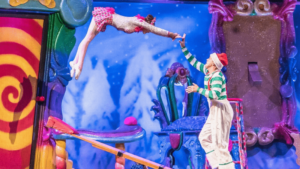Staging a conference takes a great deal of organisation – most of which will have taken place before the day of the event.
However, despite prior preparation there will still be a long list of things you need to take care of on the day.
We asked Robert Enefer, Managing Director at The Conference People to share his extensive experience of onsite operations to help make sure you don’t forget a thing.
Robert founded the Conference People in 1986 and has organised events for companies such as Fred Perry, CheckaTrade, Penguin Random House and Hitachi Data Systems.
As well as flexible event management support services, The Conference People also provides a free venue finding service, helping you find the perfect venue for any event in any location.
BEFORE THE EVENT
Arrival
It’s really important to arrive on site early so that you’re ahead of the game. This means that you can check that everything is set up correctly and get yourself organised.
For a one-day event we would ideally want to be there the evening before so we can start getting things set up and delegate bags prepared.
Registration set-up
The first thing to do is set up the registration desk; making sure it’s in the right location, it’s got power, correct signage etc. It’s important it’s highly visible and readily accessible.
In terms of equipment for registration, we would expect to have baized or clothed tabling of the right size. We would specify how much space we need depending on the quantity of badges and delegate packs. We will bring printers and laptops so we can reproduce badges if we need to.
If we haven’t already done so back at the office, we can start preparing the delegate packs and laying them out so that they can be easily passed to delegates as they arrive.
We like to have things laid out so that everything is organised, then we can concentrate on giving the delegates the right welcome, at the end of the day that is absolutely the most important thing. You need to welcome them with a smile, so it’s worth practising this with your team.
You can streamline the check-in process at your conference with Eventbrite’s Organiser App (available for iOS or Android devices).
Put attendee data at your fingertips, print an attendee list and easily check-in delegates either by swiping right on their names or scanning barcodes on their print or digital tickets. The app can be used across multiple devices, allowing you to check in large numbers of attendees in a short period of time and you can monitor live check-in stats during the event via the dashboard.
Learn more about the app here.
Need to print badges? You can do that too thanks to our integrations with partners like Conference Badges and Boomset.
Meeting room set-up
Next, we’ll check the meetings rooms and other areas we are using to ensure that they are set up correctly, with the tables, chairs and equipment we have pre-specified.
We’ll also be looking at things like the temperature of the rooms and the cleanliness and general presentation.
If we’re using an external AV company, we’ll liaise with them and ensure they are on schedule with their preparations.
Catering and facilities set-up
Other facilities that need to be coordinated include the cloakrooms and toilets, which we’ll be checking for cleanliness and servicing, and ensuring there is adequate staffing.
We’ll make sure the catering areas are set up correctly and the kitchen understands exactly what is required. If it’s a buffet, we want every dish labeled. There are always lots of specific diets and they need to be managed in the right way.
For delegates with highly specific requirements, these dishes should be delivered personally to make sure they have exactly what they need.
Pre-conference meeting
Typically we’d have a ‘pre-con’ meeting either when we arrive or in the morning before the event starts, meeting with the venue’s operations people and serving staff to make sure they understand everything.
We’ll go through the whole programme, looking at timings so they know exactly what’s required when. It’s also an opportunity for us to flag up any issues.
Rehearsals
Before the event starts we need to check that all the AV equipment is working correctly and that the sound levels are okay.
In an ideal world, we’d have rehearsals with all the speakers at this point, but they are not always able to arrive before the event starts. However, we like them to arrive at least an hour and a half before their session, which allows us time to walk them through the programme and how things are going to work.
We can ensure their presentations are set up and ready to go and that they understand how to work the equipment, so there are no hiccups during their session.
Transportation
If transport is being arranged for the conference, that may include setting up a desk at the airport or train station to welcome delegates as they arrive.
We’ll be monitoring the arrival times with airlines or train operators, checking for delays and liaising with the coach firm for their onward travel to the venue.
You might also be running shuttles from designated hotels, in which case you would need to ensure you have shuttle times displayed in the lobbies and are liaising with the drivers to check everything is on schedule.
DURING THE EVENT
Emergency procedure announcement
If there is a fire or a necessary evacuation what is the procedure? We will have established that beforehand but whoever is opening the session would need to make an announcement at the beginning of the conference to say, “If the alarm sounds, this is what needs to happen.”
Stewarding
General stewarding needs to be managed throughout the day – are all the delegates happy? Do they need any help? Does everyone know where they’re going?
We’ll also have people in place to meet and greet VIPs as they arrive during the day, and people available to assist in each session, passing microphones to delegates during Q&As, for example.
Housekeeping and timekeeping
Throughout the day, we’ll be checking the cleanliness and temperature of the rooms, tidying, collecting left over handouts and reorganising chairs between sessions etc.
We’ll also be closely monitoring the timings so that the catering can be delivered at the right times. If it looks like there are going to be any delays we can notify the kitchen.
AT THE END OF THE EVENT
Distributing questionnaires
Closing the event is very important. There are often questionnaires for delegates to fill in, which need to be distributed, collected and collated or sent online.
You may also want to ask delegates to hand in their badges so they can be recycled.
Cleaning up
Once the event is over, we make sure there is nothing left that we are responsible for in the venue – that’s any delegate packs or handouts that might be left. We make sure if there is rubbish left that the venue is happy to deal with it.
Often there is some couriering of things that need to go back. Also liaising with the AV company to make sure they similarly de-rig and clear out by the specified time.
Accounting
Usually we’d want to go through the accounting at the end of the day to make sure we don’t get any surprises later – in other words, we sign-off on the financials of the event.
Review
The day after the event, we review with the team and the client how everything went. Did the event meet its objectives, were there any issues or anything we could have done better? These are all a vital part of the process ahead of the next event.
THE LAST WORD
There’s a lot to think about on the day – even if everything runs to plan. If you think you might need extra support managing your conference, consider calling in the professionals to assist you.
Says Robert: “Typically events don’t always run completely smoothly and that’s where we come into our own. Things like speakers not turning up at the right time or the venue not delivering what has been contracted and agreed are common issues.
“The secret is to sort things out before it affects the delegates, the client or the event. A professional event management company will be monitoring everything all the time and always have a plan B in case it’s needed!”




